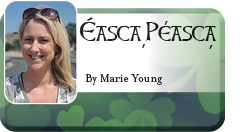

Éasca Péasca (Easy Peasy): A Growing Passion for Speaking Irish
By Marie Young
STUDENT STORY: Growing Passion for Speaking Irish
By Ethan Moser
I don’t think I ever intended to be so passionate about Gaeilge. At first it was something that I kind of just tumbled into. I was at university in Pittsburgh studying English literature and fiction writing and, due to having studied Spanish in high school, I had bypassed my school’s requirement that all student’s take at least two semesters of language study.
However, my majors were small, and I had the space in my schedule to take on a language minor if I wanted. I had already taken courses in Irish Literature and history; I had already studied abroad in Dublin in the Summer of 2016.
I was aware of Gaeilge, but it was a peripheral interest, something that I considered more as an object of a bygone history than a living part of Irish culture. I had already lost any hope of my studies being ‘practical,’ when I decided to study literature instead of STEM, and so I threw caution to the wind in my junior year at university and started my first semester of Gaeilge courses.
Needless to say, I was enamored with the language after only a few weeks of studying. Gaeilge seeped its way into all my other studies – I presented on Irish language theatre in my Performing Arts classes; I read more and more Irish literature, scanning the pages for blips of Gaeilge that I must have missed the first time around. I’m almost certain I annoyed my friends with how much I talked about my studies, but they were encouraging and curious, not only about the language itself, but why in the hell I would want to study a language that was so seldomly spoken, even in its native country.
At first, I wasn’t sure how to answer them. Like I said, I was more than aware that my decision had been wildly impractical – I didn’t see myself getting any jobs solely based on my idea to speak Irish, though I don’t pretend to have ever been fluent.
A Growing Passion for Speaking Irish
But it became a growing passion of mine. Not only for Irish but for less commonly spoken languages, ‘dying’ languages, as some people might call them. I loved Gaeilge because it was a beautiful language, but more so I loved it because of its storied and troubled history. I loved it for its perseverance in the face of seemingly insurmountable odds.
 As the last two years of my time at university passed, I went on to present on the history and current status of the Irish language at a university linguistics symposium. I returned to my old high school to teach students the basics of Gaeilge as a part of the school’s annual Foreign Language Week. It became a point of pride for me.
As the last two years of my time at university passed, I went on to present on the history and current status of the Irish language at a university linguistics symposium. I returned to my old high school to teach students the basics of Gaeilge as a part of the school’s annual Foreign Language Week. It became a point of pride for me.
I started writing fiction where the characters’ dialogue was sprinkled through with bits and pieces of Gaeilge. I posted Instagram stories in Irish, knowing that while none of my friends would be able to understand them, that they might reach out to me and ask me about the language.
While I oftentimes felt like an advocate for Gaeilge, it came along with a lingering feeling that I was speaking on behalf of a nation full of Irish folks who had had their language stolen from them over the centuries. Who was I, who picked up Gaeilge on a whim, to incorporate the language so fiercely into my everyday life?
I still struggle with those feelings sometimes; the worry that somehow this language can never belong to me; that I am speaking too frequently and loudly over voices that would be more authentic. I truly don’t know how to reconcile that, if it is something that native Irish speakers would be upset about.
By the end of my time at university, I became one of the first two students to graduate with a minor in Irish language studies; a minor that was constructed throughout my studies that I was proud to have had a hand in creating, however small.
Shortly before graduation, I got news that I’d been accepted on a full scholarship to University College Dublin to study Irish Literature. While this literature would be written in English by Irish authors, I was excited by the opportunity to speak Gaeilge amongst students who had been learning the language their whole lives.
In the weeks before classes began, I attended a meeting with an Irish language society on campus, Cumann na Gaelach. When I introduced myself as Gaeilge, with a notable American accent, the room was filled with surprised faces and shocked smiles. After the meeting had closed, I got the question I have received from nearly every Irish person I had tolc that I’d studied Irish, “Why?”
I shared bits and pieces of my story, depending on who was asking, and on how interested they seemed. I was excited to have met other students who were also excited about Gaeilge. As my first semester at UCD drew to a close, I made the decision to add Gaeilge courses onto my Master’s degree studies.
As hard as I had tried, without having classes three times a week, my Gaeilge had started to wane. It felt impossible to keep up with independently learning and maintaining a language while reading 800-page novels and writing 30-page essays.
COVID Challenges Me
Shortly before my Irish classes started, however, Covid struck. The pandemic has been so horrific for so many reasons that it seems so irrelevant now that it “interrupted” my studies. But I’d be lying if I said I wasn’t upset about it.
Since early 2020, I have felt my Gaeilge fading, both in comprehension and my ability to speak the language, even casually. I notice myself making basic mistakes when messaging my old Irish professor online.
Sometimes I get angry with myself for not having more initiative to continue learning Gaeilge independently. Duolingo helps, but life always seems to get in the way, especially during a global pandemic.
But when I take a step back and look at how far my Gaeilge studies have brought me, all the joy and love and laughter this language has brought to my life over the last five years, I remember what my Irish professor always used to tell us, an old Gaeilge adage that I carry with me everyday: is fearr Gaeilge bhriste ná Béarla cliste. Broken Irish is better than clever English. And the truth is, my Irish is broken, but I can always fix it, make it better. Just like the language itself has rolled with the punches of history; I am confident that this isn’t the end of my Gaeilge journey.



Monthly newsmagazine serving people of Irish descent from Cleveland to Clearwater. We cover the movers, shakers & music makers each and every month.
Since our 2006 inception, iIrish has donated more than $376,000 to local and national charities.
GET UPDATES ON THE SERIOUS & THE SHENANIGANS!